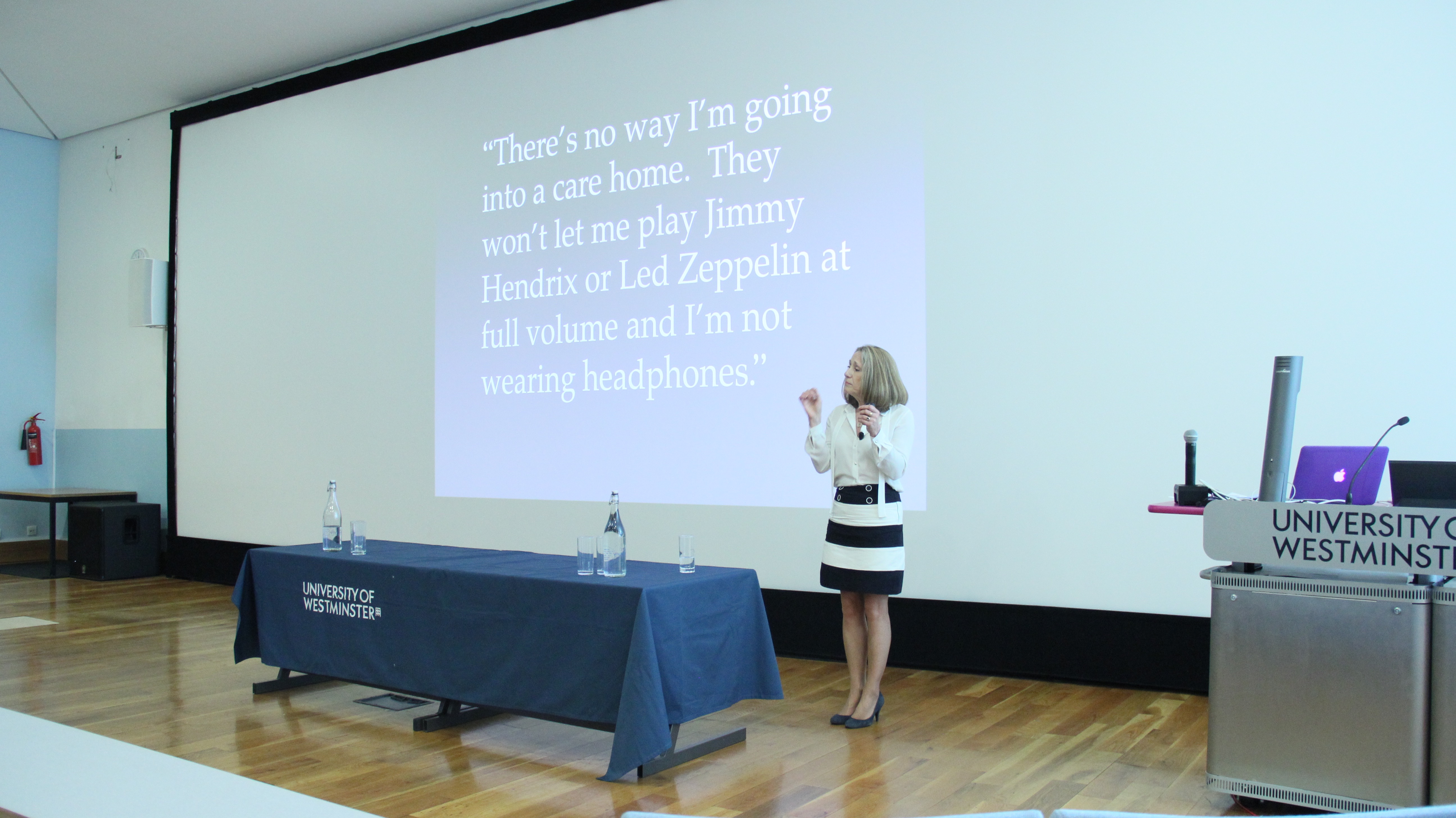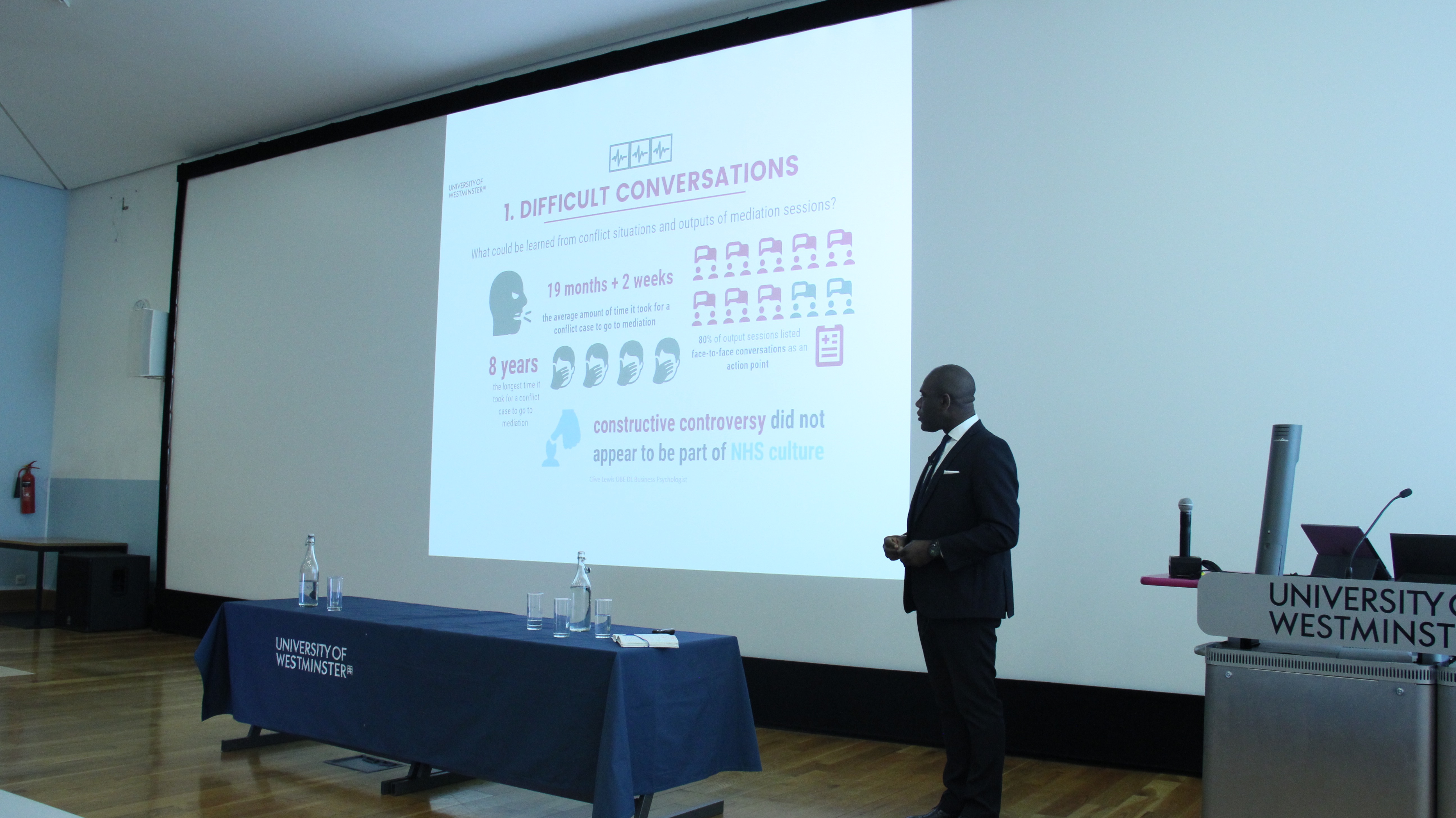On Wednesday 12th April, the Westminster Business School held their annual HRM Conference with a spectacular line-up of guest speakers. The event kicked off to the music of Led Zeppelin with Black Dog, as Dr Lynda Shaw presented her work on “Motivational Factors; variation by age band”, discussing the importance of understanding who your employees were when they were teenagers, and using this to shape your motivation techniques.

This was then followed by our next speaker, Clive Lewis OBE who delivered his research on “Mediation and Organisation Diagnosis in the NHS”, where he discussed subjects such as conflict situations and outputs of mediation sessions, and the power of apology.

Other guest speakers included Kay Sahdev who presented her research on “Talent Management in Challenging Contexts” and Westminster Business School senior lecturer, Zorica Patel on “Positive Psychology Toolkit for HRM professionals”.

Our final speaker from the conference is Stella Collins, a learning specialist and author of ‘Neuroscience for Learning and Development’. Stella presented her work on “Harnessing the Brainwaves in your Organisation”. Stella kindly agreed to share some of her research with the Westminster Business School Blog, below find her fascinating insights on brainwaves.
How often do you have a brainwave?
The answer is all the time because your brain is constantly emitting electrical pulses as you go about your daily life and even when you’re asleep – these pulses are called brainwaves. So what are brainwaves, how do they affect your performance at work and can you control them?
Brainwaves in animals were first noticed as electrical activity in the brain by Richard Caton in 1875 and the first human brain waves were recorded by Hans Berger in 1924 who also invented the electroencephalogram (EEG) machine.
Your brains emit a variety of brainwaves all the time time but particular ones tend to dominate when you’re engaged in particular activities.

The so called ‘Brain wave’, when you have one of those eureka moments, may well be the fasted ones called gamma waves which oscillate at 40-100Hz. They’ve rather intriguingly also been identified when people are in a state of deep meditation – usually associated with slower brain wave activity. It’s possible this may coincide with moments of insight so it may be an idea to attend those meditation classes after all – you might find yourself having more ‘brain waves’
When you’re working hard, thinking, processing, focusing and actively processing information beta brain waves (12-40Hz) dominate but that level of activity can’t be sustained all the time so our brains need to take a break.
Slower alpha waves (8-12Hz) dominate when you’re in a relaxed state such as just dropping to sleep or possibly when you’re day dreaming at your computer; you look as if you’re working, people may think you’re having beta brainwaves but you know you’ve switched tracks. Alpha brainwaves are associated with creative thinking and can be stimulated by deliberately relaxing, certain music, mindfulness practise and even good old fashioned day dreaming. A short nap of 15 minutes has been consistently shown to boost cognitive skills shortly afterwards and if you drink a strong coffee just before your nap you’ll have the dual boost of the caffeine kicking in just after your nap too.
Deep sleep and dream sleep are both necessary for memory formation and dreaming seems to be an opportunity for us to rehearse what we’ve learned, particularly for skills based learning. Whilst we are dreaming slower theta waves (4-8HZ) dominate and then in deep sleep the slowest brain waves, delta waves (0-4HZ) predominate. During deep sleep the flow of information in our brains changes from input to consolidation and storage. So if you need to remember information you might want to consider bite size learning in chunks across a few days so you can sleep in between bouts of learning, thus potentially embedding it better.
Thank you to Stella Collins on sharing her work and thank you to all of our presenters who took part at this years annual HRM Conference 2017. Stella will be holding a Masterclass on her book Neuroscience for Learning and Developments, find out more here. She is also holding programmes on How to be a Brain Friendly Trainer in May, find out more here. If you would like to keep an eye out for more workshops then visit www.stellarlearning.co.uk or contact them on Tel: +44 118 983 6339 Mob: +44 797 110 6697
If you are interested in a career within HRM, you can find the courses we offer here.
Latest posts by Faye Murphy (see all)
- MA/MSc Marketing Management Students Enjoy A Residential Weekend At Beaumont Estate - March 19, 2018
- What It Takes To Work In The Charity Sector With University Of Westminster Alumni - March 6, 2018
- IBM University Business Challenge Bristol Semi Finals Get Underway, By Karen Kufuor - February 28, 2018

Wonderful information, thanks for compiling it and taking your time to share.